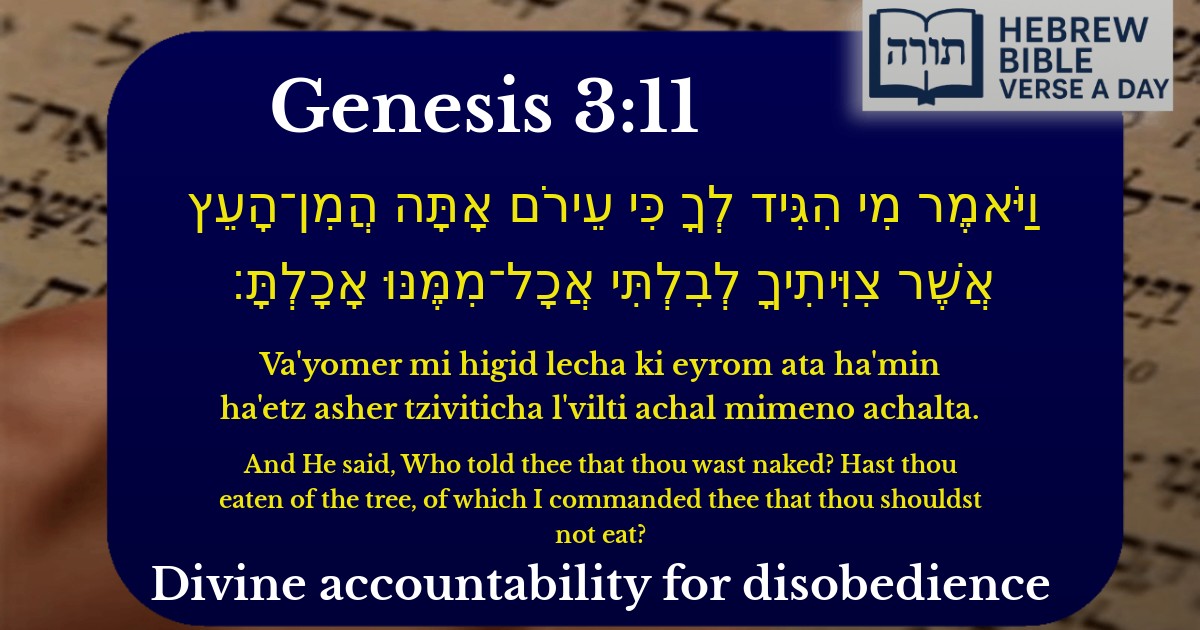Join Our Newsletter To Be Informed When New Videos Are Posted
Join the thousands of fellow Studends who rely on our videos to learn how to read the bible in Hebrew for free!
Hebrew Text
וַיֹּאמֶר מִי הִגִּיד לְךָ כִּי עֵירֹם אָתָּה הֲמִן־הָעֵץ אֲשֶׁר צִוִּיתִיךָ לְבִלְתִּי אֲכָל־מִמֶּנּוּ אָכָלְתָּ׃
English Translation
And He said, Who told thee that thou wast naked? Hast thou eaten of the tree, of which I commanded thee that thou shouldst not eat?
Transliteration
Va'yomer mi higid lecha ki eyrom ata ha'min ha'etz asher tziviticha l'vilti achal mimeno achalta.
Hebrew Leining Text
וַיֹּ֕אמֶר מִ֚י הִגִּ֣יד לְךָ֔ כִּ֥י עֵירֹ֖ם אָ֑תָּה הֲמִן־הָעֵ֗ץ אֲשֶׁ֧ר צִוִּיתִ֛יךָ לְבִלְתִּ֥י אֲכׇל־מִמֶּ֖נּוּ אָכָֽלְתָּ׃
וַיֹּ֕אמֶר מִ֚י הִגִּ֣יד לְךָ֔ כִּ֥י עֵירֹ֖ם אָ֑תָּה הֲמִן־הָעֵ֗ץ אֲשֶׁ֧ר צִוִּיתִ֛יךָ לְבִלְתִּ֥י אֲכׇל־מִמֶּ֖נּוּ אָכָֽלְתָּ׃
🎵 Listen to leining
Parasha Commentary
📚 Talmud Citations
This verse is quoted in the Talmud.
📖 Sanhedrin 38b
The verse is discussed in the context of Adam's sin and his dialogue with God, exploring the implications of his disobedience.
📖 Avodah Zarah 5a
The verse is referenced in a discussion about human nature and the consequences of Adam's actions for all humanity.


Understanding the Divine Question
The verse (Bereishit 3:11) begins with Hashem's question to Adam: "Who told thee that thou wast naked?" Rashi explains that this question was rhetorical, meant to prompt Adam to reflect on his actions. Before eating from the Tree of Knowledge, Adam and Chava were unaware of their nakedness (Bereishit 2:25), as their purity shielded them from such consciousness. Only after their sin did they perceive their physical state as a deficiency, indicating a spiritual fall.
The Nature of the Sin
Hashem continues: "Hast thou eaten of the tree, of which I commanded thee that thou shouldst not eat?" The Ramban (Nachmanides) notes that Hashem already knew Adam had sinned but engaged him in dialogue to allow for teshuvah (repentance). The phrasing emphasizes the severity of violating a direct commandment (mitzvah), as Adam had been given only one prohibition—yet he transgressed it.
Midrashic Insights
Lessons in Accountability
The Maharal (Gur Aryeh) highlights that Hashem's questioning follows a pattern of holding individuals accountable. Instead of immediate punishment, Adam is given the opportunity to confess. This mirrors the Jewish concept of din ve-cheshbon (judgment and accounting), where one must confront their actions before divine justice.